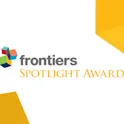
Health
10 Jul 2017
With Obesity Becoming the New Normal, What Should We Do?
Research Topic cross listed in 15 Frontiers journals is open for submissions “With Obesity Becoming the New Normal, What Should We Do?

Health
10 Jul 2017
Research Topic cross listed in 15 Frontiers journals is open for submissions “With Obesity Becoming the New Normal, What Should We Do?

Frontiers news
14 Jun 2017
Superintelligence: fact or fiction. First Frontiers Spotlight Award Winner for outstanding research into human brain augmentation

Life sciences
15 May 2017
This Research Topic, published in Frontiers in Microbiology, provides a home for studies exploring how the microbiome and host organisms interact.

Health
28 Apr 2017
Frontiers in Immunology is honored to announce a memorial Research Topic dedicated to Dr William Erwin Paul and his unparalleled contribution to immunology.

Humanities
03 Apr 2017
This is the question that researchers want to address in their inter-disciplinary Research Topic ‘Birth’.

Space sciences and astronomy
24 Feb 2017
How the complex dynamics of the Earth-Moon system and its applied and fundamental physics may play a crucial role in the future of space exploration – by Claudio Bogazzi, PhD, frontiersin.org In what has been an incredible week for astronomy and space science a group of seven planets, all close in size to the Earth, was discovered around the dwarf star Trappist-1, in the constellation of Aquarius, only 39 light years away from us. It is the first time that so many Earth-sized planets have been found in orbit around the same star, perhaps warm enough for water and the life it can sustain. Whilst we won’t be visiting Trappist-1’s planets any time soon, Frontiers in Astronomy and Space Sciences has just launched an exciting Research Topic focusing on the complex dynamics of the Earth-Moon system and the applied and fundamental physics that will play a crucial role in the future of space exploration. At distance from Earth of approximately 385,000 km, the Moon has always fascinated humans. For scientists, the historic landing in 1969 represented an important step towards a full understanding of the Moon’s secrets, the Earth-Moon system and the challenges and opportunities for the farther exploration of […]

Frontiers news
13 Dec 2016
The 1st annual Frontiers Spotlight Award Committee has been announced and will reward an outstanding Research Topic with US$ 100,000 to organize a conference.

Frontiers news
25 Nov 2016
The annual $100,000 competition is now open. All Frontiers Research Topics completed in 2017 will be considered.

Life sciences
20 Mar 2016
By Kirsten Martin In conservation, there is an ongoing debate over triage. Advocates of triage argue that some extinctions are unavoidable, and that fixed, limited and fully fungible resources are therefore best allocated where they are most likely to yield the largest conservation benefit. That is, they perceive conservation essentially as an economic optimisation problem. But the opponents of triage believe the opposite. They argue that species recovery is possible no matter how few individuals remain, that small peripheral subpopulations may contain genetic diversity not available in larger core populations, and that funds and resources are neither fixed nor fully fungible. They think that conservation resources are at least partly tied to particular sites and species, and can be increased. Needless to say, both sides have strong opinions and more research and case studies are needed to gain a further understanding. The Frontiers Research Topic “Triage in Conversation” hopes to shed a brighter light on the debate. Professor Ralf Buckley, Specialty Chief Editor of the section Frontiers in Conservation, recently wrote an article entitled “Grand challenges in conservation research.” We asked him about the debate and the importance of this research. Tell me about the Research Topic (the research area […]

Engineering
12 Jan 2016
We are very proud to announce the publication of Frontiers in Built Environment‘s first eBook: “Critical Earthquake Response of Elastic-Plastic Structures Under Near-Fault or Long-Duration Ground Motions: Closed-Form Approach via Impulse Input” which can be accessed and freely downloaded here: fron.tiers.in/go/J3u5ts Containing four original research papers, in addition to the Specialty Grand Challenge article, on the critical earthquake response of elastic-plastic structures under near-fault or long-duration ground motions, this eBook represents the culmination of outstanding recent research by Specialty and Field Chief Editor, Prof. Izuru Takewaki. Those who avail of the opportunity to host a Research Topic in Frontiers in Built Environment can also benefit by collating their curated collection of papers in a free eBook upon successful closing of their Topic. — Launched in February 2015, Frontiers in Built Environment is already establishing a solid reputation and setting a standard for high-quality, open-access publishing in a number of sections in the built environment field. Specialty sections currently open for submission include: Bridge Engineering Digital Architecture Earthquake Engineering Heating, Ventilation and Air-Conditioning Hydrosphere Structural Materials Structural Sensing Sustainable Design and Construction Wind Engineering and Science We will also soon be launching the following specialty sections: Urban Science Transportation and Transit Systems […]

Climate action
30 Nov 2015
by Nina Rothe The Frontiers Research Topic on “The Pathway to Solutions: New Frontiers in Climate Change Adaptation & Mitigation” has just launched. The 2015 Paris Climate Conference (#COP21), is poised to lead a shift in focus in climate change research from an emphasis on the scientific test of the role of human activity, already consolidated into strong evidence, to a focus on solutions to prepare society to adapt and mitigate the consequences of a warming planet, where knowledge is urgently needed. Frontiers will support this shift by collecting the latest research on climate adaptation and mitigation across multiple scientific disciplines to be published in a unique Research Topic. Business leaders are putting increasing pressure on governments to act and to achieve a legally binding and universal agreement on climate. As the biggest side event at COP21, France, in partnership with United Nations Environment Programme (UNEP) and the European Commission’s Climate Action network, are hosting the Sustainable Innovation Forum (SIF15), convening cross-sector participants from business, government, finance, UN, NGO and civil society to bolster innovation and further accelerate international sustainable development. To provide policy makers, industry, and business leaders with the latest scientific findings, we are calling for submissions covering all […]

Neuroscience
23 Apr 2015
NEW RESEARCH TOPIC: Are you passionate about computational modelling of neuropsychological disorders? Do you research different levels of modelling (from spiking neurons to higher-level connectionist modeling ) using imaging and behavioral data? Then this topic is for you. “Neuropsychology through the lenses of computational modelling”, is a new Research Topic open for submissions in Frontiers in #ComputationalNeuroscience. Read more: https://lnkd.in/eBb3Wi9

Health
29 Oct 2014
A new Frontiers in Immunology Research Topic brings together the stories of those at the forefront of modern-day immunology “In the highly competitive world of biomedical science, often the rush to publish and to be recognized as ‘first’ with a new discovery, concept or method is lost in the hurly burly of the moment, as ‘the maddening crowd’ moves on to the next ‘new thing’. One of the great things about immunology today is that it has only matured as a science within the last half-century, and especially within the past 35 years as a consequence of the revolution of molecular immunology, which has taken place only since 1980. Consequently, most of those who have contributed to our new understanding of how the immune system functions are still alive and well, and still contributing. “‘A Living History of Immunology’ intends to collate as many stories as possible from the investigators who actually performed the experiments that have established the frontiers of immunology. Accordingly, we are after the ‘truth’, to combat ‘revisionist science’, by those who want to alter history by telling the stories a different way than actually happened. In this regard, one of the good things about science versus […]

Frontiers news
27 Feb 2013
Here is a step by step guide on how to submit and host a Research Topic to drive scholarly communication in your research field For your online proposal, everything you need is listed below: 1. The Topic Editors: You can host a Research Topic on your own, but many of our most successful Topics were co-hosted by a senior researcher and one or two early-career scientists. 2. A Title: A compelling and concise title. 3. A Description: Set up the scope of your Research Topic with a maximum of 500 words. Strive for encyclopedic coverage, considering a range of questions, theories, methods, areas of impact, historical perspectives, etc. 4. Deadlines: 6-8 months is often the best time frame, but this is flexible. Consider 2 months for abstract submissions and 4-6 for manuscript submissions. 5. A List of candidate contributors: Compile a list of researchers that cover as many nuances of your Research Topic as you can think of. Ideally a Topic should receive at least 10-15 manuscripts. http://vimeo.com/moogaloop.swf?clip_id=52089266 All Frontiers publications are free to access (under a Creative Commons license). Like other high-quality open access journals, this means that accepted manuscripts for certain article types are subject to a publishing fee. In […]

Frontiers news
27 Feb 2013
If you have received a message asking you to contribute a manuscript to a Frontiers research topic, the next step is easy. Simply submit your manuscript through the standard Frontiers manuscript submission, but be sure to note that your submission is part of a Research Topic. Select the Research Topic to which you would like to contribute and proceed through the next steps of the manuscript submission process. Even if you have not received a formal call for participation, your submission is still welcome. You should first submit an abstract (maximum one page) to the topic editor. You may do this through the relevant Research Topic homepage by clicking “submit abstract.” Following approval by the topic editor, you are welcome to submit the full manuscript. For author guidelines and manuscript instructions, click here. If you have any questions, please contact the Frontiers Editorial Office at: researchtopics@frontiersin.org FRONTIERS RESEARCH TOPICS JOURNAL PAGES Frontiers in Endocrinology Frontiers in Genetics Frontiers in Microbiology Frontiers in Immunology Frontiers in Neurology Frontiers in Neurosciences Frontiers in Oncology Frontiers in Pharmacology Frontiers in Physiology Frontiers in Plant Science Frontiers in Psychiatry Frontiers in Psychology Frontiers in Pediatrics (coming soon) Frontiers in Chemistry (coming soon)
Get the latest research updates, subscribe to our newsletter